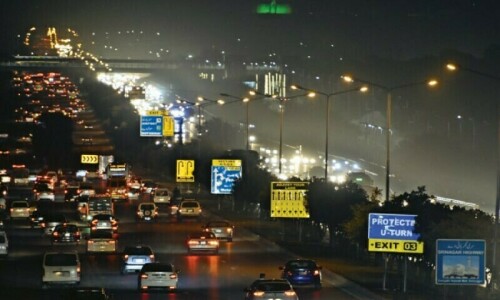ISLAMABAD: Deputy Country Representative Unicef Sharmeela Rasool on Thursday said the world was in the climate crisis mode as the problem was no longer of the future, but of the present.
She was speaking at a roundtable discussion on ‘Climate-Compatible Education’ held at the Institute of Regional Studies on Thursday.
Ms Rasool said when we talk about climate crisis, we should not forget about the biodiversity loss that the world was going through as well as pollution.
She went on to say that climate compatible education was very important for two reasons.
The first reason, she said, was that children were most vulnerable to climate crisis.
“We have seen this in the monsoon that happened in 2014; we’ve seen this in the recent floods in 2020,” she said, adding that the effects of these climate-driven disasters were terrible.
The second reason, she said, was that education offered a significant pathway to find solutons.
Therefore, keeping these points in mind, making the education system double resilient was very important, she said, adding that the education system should develop the approach to mitigate climate crisis, or climate change as it was normally called.
Coordinator to the Prime Minister on Climate Change Romina Khurshid Alam said there was a need to mitigate the effects of climate change, which could not be possible without the support of children.
She said she believed that amazing things could be done by children, and for that an education system played an important role. Ms Alam quoted the example of a four-year-old girl who forced her family to shun the use of plastic at home.
She also discussed the significance of advocacy campaigns, carbon credits and introducing climate education at the montessori level.
Asian Institute of Eco-civilisation, Research and Development (AIERD) Chief Executive Officer Shakeel Ahmed Ramay highlighted the need for a climate compatible education system.
He said when we look at the statistics of Pakistan, “we have 36 million children below the age of five, 97 million children below the age of 15, and 62 million people between the ages of 15 and 29.”
“Therefore, our future very much depends on the education system; we have to train a nation,” he said.
He also spoke about how effects of climate change led to food insecurity.
“The floods of 2022 in Pakistan caused millions of rupees of damage to the infrastructure alone,” he said, adding that from 2010 to date, Pakistan had lost almost $3 billion in floods.
Director of D-8 Organisation for Economic Cooperation Punjul Nugraha said COP29 was a crucial platform for integrating climate education into the global agenda as it would bring together policymakers, experts and stakeholders.
He stressed on the importance of education for understanding and addressing environmental challenges, saying that 1.2 billion children were expected to be affected by climate change by 2050 globally if urgent measures were not adopted.
Ambassador of Azerbaijan Khazar Farhadov reiterated his country’s commitment as the host of this year’s COP to global solidarity in combating cliamte change.
He said Azerbaijan hoped to lead by example, and highlighted the climate-smart cities set up throughout his country.
Sustainable Development Policy Institute (SDPI) Executive Director Dr Abid Qayium proposed three-pronged approach to climate
compatible education: curriculum reforms, mitigation through renewable technologies and adaptation strategies.
AIERD Chairman Zahid Latif Khan suggested collaboration between the ministries of climate change and education to advance climate compatible education.
IRS President Jauhar Saleem said there was a need to education the youth on how climate change affected them and their future.
Published in Dawn, September 13th, 2024














































Dear visitor, the comments section is undergoing an overhaul and will return soon.